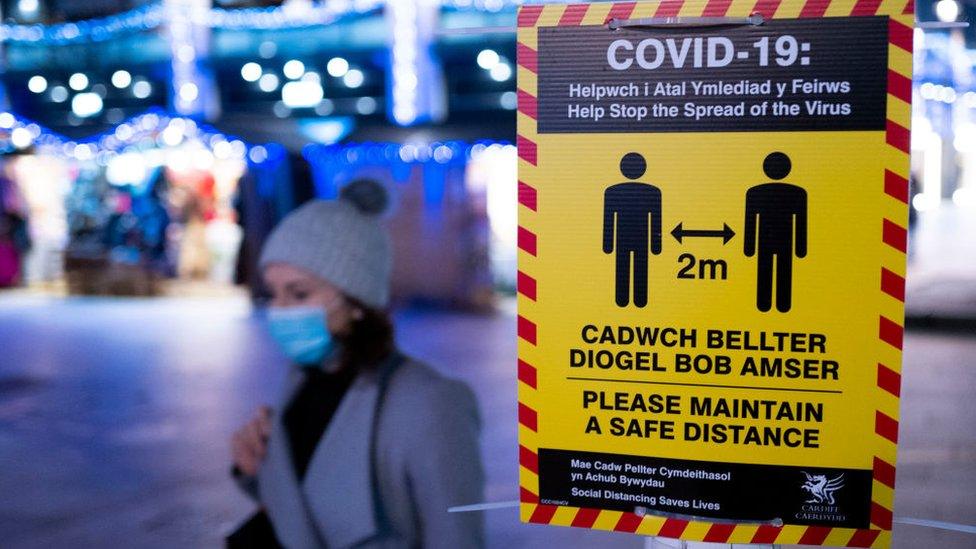Covid-19: Most coronavirus rules to end in Wales on 7 August
- Published
- comments

Despite the relaxation of rules in Wales, masks will still be expected to be worn in shops, health and social care settings, and on public transport
The majority of coronavirus restrictions in Wales will come to an end on Saturday as the country moves to what's known as "alert level zero".
It means rules on the number of people that can meet indoors will end and social distancing will also be scrapped.
However, masks will still be expected to be worn in shops, health and social care settings, and on public transport.
Also, self-isolation rules will remain in place for people who either have Covid-19 symptoms or who receive a positive test result.
There will be no legal limits on the number of people who can meet, including in private homes, public places or at events
Businesses which were required to be closed will be able to re-open, including nightclubs
Premises which are open to the public and workplaces will have more flexibility about which measures they take to minimise the risk of coronavirus
Face coverings will not be a legal requirement in hospitality settings where food and drink is served, but will continue to be required in most indoor public places
The country's first minister Mark Drakeford has warned the move to the lowest level of restrictions does not mean "the end of restrictions and a free-for-all"
Despite the upcoming changes to the rules, Wales' first minister Mark Drakeford has warned that the government's decision to move to its lowest level of restrictions does not mean people should fail to act with caution.
"Alert level zero does not mean the end of restrictions and a free-for-all. But it does mean we can all enjoy more freedoms with the confidence there are still important protections in place to make sure our public health is being safeguarded while we are out and about," he said.
"Unfortunately, the pandemic is not over yet and we all need to work together to do everything we can to keep this virus under control - at alert level zero, everything we do will have an impact on this virus."
What about the rest of the UK?
School bubbles have been scrapped in England
In England, the majority of Covid rules were scrapped last month on the 19 July. Face masks are no longer a legal requirement, although people are being encouraged to continue wearing them on public transport and in some shops. Social distancing rules have also come to an end and there are no legal limits on the number of people who can meet both indoors and outdoors. School bubbles have been scrapped, and from 16 August, those under 18 will also no longer need to self-isolate after being a close contact with someone who has coronavirus.
However, the prime minister has continued to stress that the pandemic isn't over and people should still be cautious.
Scotland will move to its lowest Covid level on Monday 9 August
The majority of Covid restrictions will no longer apply in Scotland from Monday. Rules on social distancing and limits to the size of social gatherings will be removed. However, people will still need to wear face coverings in shops, hospitality venues and on public transport.
Also, close contacts of people who test positive for coronavirus will no longer have to automatically self-isolate, as long as two weeks have passed since they received their second dose of the vaccine, and they have no symptoms.
Those between the ages of five and 17 years old who are flagged as a close contact of someone who tests positive for Covid will need to take a PCR test, but they'll be able to end self-isolation if it comes back negative.
Northern Ireland has relaxed Covid rules gradually
Some changes to restrictions in Northern Ireland were brought in on the 26 July, however, the country has relaxed its rules more gradually. At the moment, 10 people from three households are able to meet inside a private home and 15 people can come together in a private garden. Children do not count towards the total number in both instances.
Social distancing has been reduced to one metre indoors and removed for outdoor activities. However, face masks are still required in lots of places including restaurants and hotels when customers are not seated at a table, on public transport and in shops.
- Published19 July 2021
- Published5 August 2021
- Published3 August 2021
